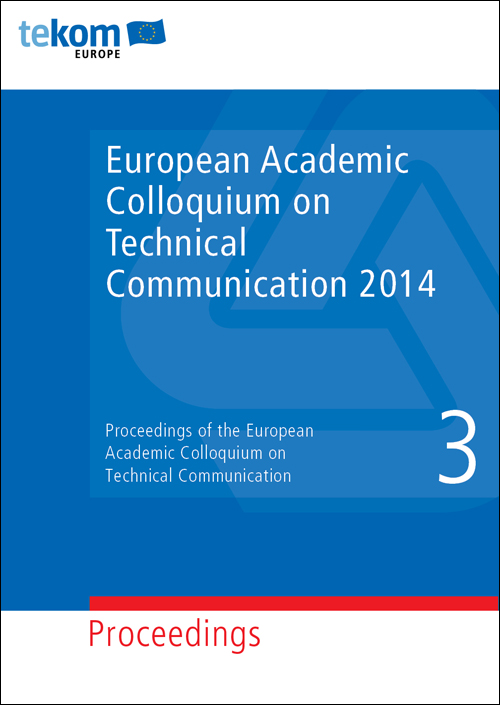
Bibliographic Information
17 x 24 cm,
96 Pages,
1. Edition 2015
ISBN 978-3-944449-44-9 (Softcover)
ISSN 2196-6206
PDF,
96 Pages,
1. Edtion 2015
ISBN 978-3-96393-038-6 (E-Book PDF)
ISSN 2196-6206
Proceedings of the European Academic Colloquium on Technical Communication 2014
Author(s): Löckinger, Meng , Bader, Cleary, Fritz, Straub, Peraldi
Publisher: European Association for Technical Communication - tekom Europe e.V.
Publishing Company: tcworld GmbH
- Subjects:
- Year Books & Summarys
- Categories:
- Proceedings
37,50 € (for Members 25,00 €) Softcover, 96 Pages Status: Available
22,50 € (for Members 15,00 €) E-Book PDF, 96 Pages Delivery time: 2-3 working days Status: Available
48,75 € (for Members 32,50 €) Bundle Softcover & E-Book PDF
The third “European Academic Colloquium on Technical Communication” was held in the ICS International Congress Center in Stuttgart, Germany, on November 10, 2014. The topic of the event was “Technical Communication: A Research Perspective on Processes of Content, Language and Design.” This volume will keep you up to date on the latest trends in the field.
This annual conference is organized by tekom Europe and targeted at European scholars in the field of technical communication and its related disciplines, such as translation, multilingual communication, localization, terminology, and information management. Since 2011, the European Academic Colloquium on Technical Communication Studies (EAC) has served as a significant venue for the dissemination and sharing of technical communication research and practices in a European context.
The EAC 2014 program and the contents of these proceedings show a diversity of research and practices, drawing on processes of content, language and design, and reflecting further progress in understanding and analyzing these processes. The contributions address diverse aspects that range from examining writing rules, searching for domain-specific information, and improving technical communication through corpus-based terminology to technical communication education including qualifying competencies, job profiles, and curriculum development.
